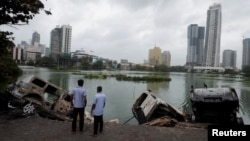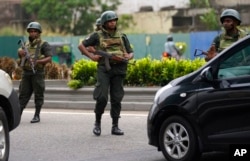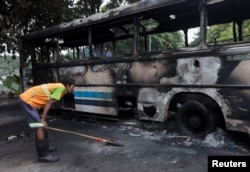Fresh protests gripped Sri Lanka a day after a wave of deadly violence wracked the nation that has been engulfed by angry anti-government demonstrations since sinking into a deep economic crisis.
Defying the imposition of a nationwide curfew and thousands of troops on the streets, protesters chanted slogans to press their weekslong demand that President Gotabaya Rajapaksa quit.
His brother, Mahinda Rajapaksa, stepped down as prime minister on Monday in the aftermath of the violence that claimed the lives of seven people and injured more than 200 others.
But his exit has not placated the protesters, who blame the powerful Rajapaksa family for the country's dire economic woes that have fueled runaway inflation, led to massive shortages of food and fuel, and left citizens and businesses grappling with hourslong daily power cuts.
"One down, one to go," was one of the chants heard at the protests where "Gota, go home" has been the rallying cry.
Analysts say the volatile situation will complicate efforts to address the deepening economic crisis that has triggered the largest-ever civil society protests in the country.
The spontaneous protests, led by thousands of students, professionals and people from all ethnic groups, had been largely peaceful until Monday, when supporters of Mahinda Rajapaksa, armed with sticks and iron clubs, stormed a camp set up by the demonstrators outside the prime minister's residence and set fire to their tents.
The skirmishes began after the now-former prime minister addressed supporters at his official residence. Clashes also erupted at a seaside promenade where demonstrators have been gathering.
For many protesters, that incident marked a turning point. In what are seen as reprisal attacks, the violence spilled into the night with angry crowds setting fire to homes and shops owned by government lawmakers.
About 250 kilometers away from Colombo, the family home of the Rajapaksas in Hambantota was also set ablaze and a memorial built for their parents damaged. Social media posts showed people cheering as the properties were enveloped in flames.
In the capital, thousands of protesters stormed the gates of the official residence of the prime minister, who, according to reports, was taken out of his residence by the military in a pre-dawn operation to an undisclosed location.
In Colombo, vigilante groups were reported to be blocking the route to the airport in an apparent bid to prevent people loyal to the Rajapaksas from leaving the country.
"Violence won't solve the current problems," President Gotabaya Rajapaksa said in a tweet on Monday. "I request all citizens to remain calm & exercise restraint. I urge everyone to work together in solving this crisis."
The president, who has repeatedly said that he has no intention of stepping down, declared a state of emergency last week as the protests showed no signs of waning. The emergency gives broad powers to the military and police to detain and question people without arrest warrants.
Analysts point out that the country faces a serious political vacuum. The prime minister's resignation means his Cabinet is dissolved. That includes the recently appointed finance minister, Ali Sabry, who was leading talks with the International Monetary Fund on a bailout package.
"It is a very worrying situation. Except the president, there is virtually no government. But we need a stable government to put in place policies that will enable the country to address its economic woes," said Jehan Perera, who heads the National Peace Council, a non-governmental advocacy group in Colombo. "The IMF has clearly said that this is necessary."
A statement from the president's office said he has invited all parties in parliament to join a united national government.
Opposition parties, however, said on Tuesday that they called off unity talks with the government after the outbreak of violence. The opposition also rejected a previous appeal by the president to join his administration.
"It would be a difficult time to be in government. Whoever comes has to take every unpopular and hard decision such as raising taxes at a time when the cost of living is already unaffordable for many," Perera pointed out.
The government blames the economic crisis on the pandemic that battered its tourist-dependent economy. But it is also blamed on economic mismanagement that led to foreign exchange reserves virtually running dry in a country that is heavily dependent on imports of essential commodities such as food and fuel. Last month, Sri Lanka defaulted on its foreign debt for the first time.






